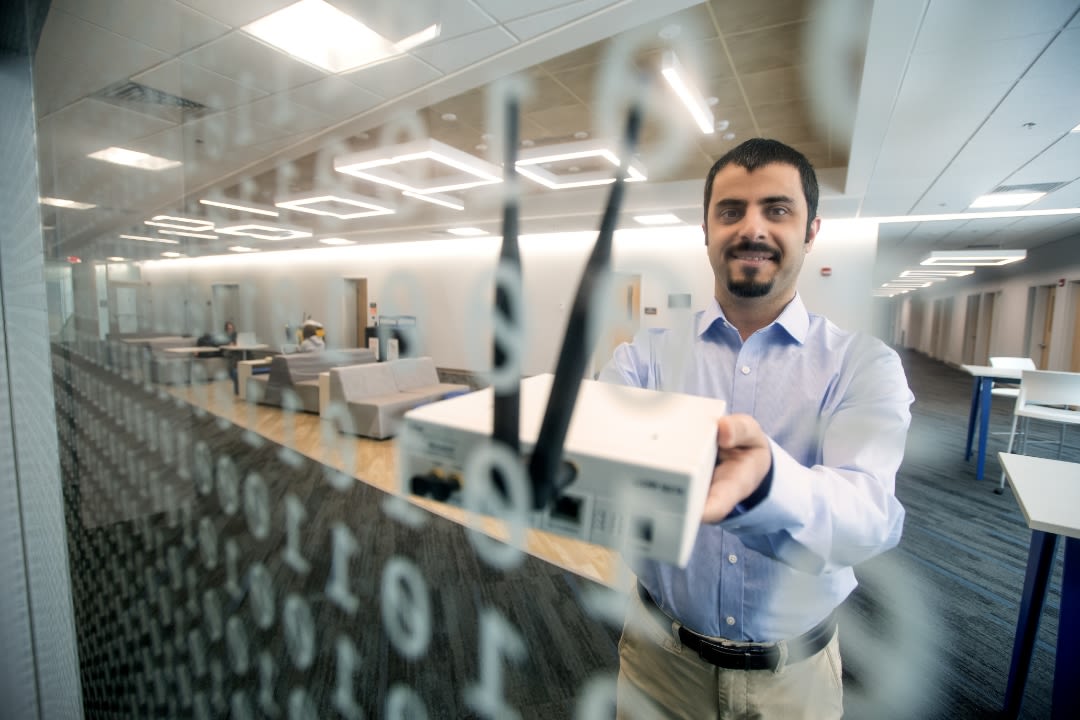Shaping the Future of Cybersecurity
Rochester Institute of Technology is a national leader in cybersecurity research, education, and training.

In the ever-evolving landscape of cybersecurity, the demand for skilled professionals has never been higher. With a focus on cutting-edge research, innovative academic programs, and unique training opportunities, RIT is positioned at the forefront of cybersecurity excellence.
Cutting-Edge Cybersecurity Research
RIT is pioneering innovative solutions and advancing the boundaries of cybersecurity research to address the ever-evolving challenges presented by the field. Our research agenda is powered by more than forty faculty members across multiple RIT colleges, which informs our research with perspectives from engineering, psychology, and public policy.
Securing the Future: Vehicle-to-Vehicle Communications
Driver assistance and autonomous driving systems have the potential to save tens of thousands of lives every year. However, the advanced wireless systems for connected vehicles that will make these technologies possible are vulnerable to cyberattacks. Hanif Rahbari, an assistant professor of cybersecurity at RIT, recently earned the prestigious NSF CAREER Award for his work to enhance connected vehicle security. Rahbari is developing and validating new protocols to secure the growing connected vehicle ecosystems already in use today. The techniques he and his team of students create will also protect wireless communications among vehicles from quantum-related attacks in the future.
AI at the Helm: Machine Learning and Security
RIT's commitment to cutting-edge research extends to the realm of artificial intelligence. Ashique KhudaBukhsh, an assistant professor of software engineering at RIT, employs machine learning in large data sets to detect and better understand patterns in a socio-political context. KhudaBukhsh’s insights were included in a Sunday New York Times cover story highlighting research utilizing machine learning to glean insights about the Jan. 6 Capitol Riot. KhudaBukhsh’s recent research highlights Large Language Models (LLM) limitations, which has led to YouTube fixing unsafe transcriptions in children’s videos. His research, at the intersection of machine learning and cybersecurity, is being used to develop solutions to emerging threats.


Beyond the Headlines: Deepfakes, Cryptography, and Detection Systems
Matt Wright, professor and chair of the department of cybersecurity, leads RIT’s efforts in tackling challenges posed by deepfakes and developing sophisticated detection systems. Using the latest in AI research, the DeFake Project is building software designed specifically to help journalists uncover deep fakes–videos so believable that even those charged with vetting the content could inadvertently share them. The team is one of eight winners of the Knight Foundation’s AI and the News Open Challenge.
The addition of Billy Brumley, the Kevin O’Sullivan Endowed Professor in Cybersecurity, bolsters RIT’s expertise in system security, cryptography engineering, and side-channel analysis.
Innovative Academic and Training Programs
The World Economic Forum estimates that the world needs 3.4 million cybersecurity experts to support today’s global economy, but industries are struggling to fill that gap. At RIT, cybersecurity students get the crucial real-world experience needed to become leaders in the field.
Cybersecurity students acquire theoretical and technical knowledge, engage in cooperative education at leading cybersecurity organizations and government agencies, participate in immersive hands-on experiences and national competitions, and undertake dynamic research. At the center of RIT’s initiatives is the ESL Global Cybersecurity Institute, which includes the state-of-the-art Cyber Range and Training Center. The Cyber Range delivers an immersive experience where students react to realistic threat scenarios on a scale that mirrors the massive cyber-attacks that have occurred globally.
Raising the Bar: Innovative Programs Lead to Top-Tier Outcomes
RIT recognizes that cybersecurity is accomplished through diverse tools and methods. That’s why our robust suite of academic programs covers key areas of cybersecurity and the disciplines it impacts including analytics, artificial intelligence, computer science, engineering, machine intelligence, intelligent systems, robotics and cybernetics, and more. RIT’s bachelor’s degree in cybersecurity is nationally ranked (#19) by U.S. News & World Report and boasts a 100% outcome rate. RIT also offers a master's degree in cybersecurity and a Ph.D. in computing and information sciences. Our doctorate caters to the diverse needs of professionals seeking advanced expertise in cybersecurity and artificial intelligence and those inclined to develop and design the future of cybersecurity and AI via research.

Graduates of RIT’s programs are in demand by leading companies and organizations, including Amazon Web Services, BAE Systems, Inc., TJX Companies, TEKsystems, Security Risk Advisors, Siege Technologies, Security Innovation, Salesforce.com, PNC Financial Services, Paychex Inc., National Security Agency (NSA), MITRE, MIT Lincoln Laboratory, Microsoft, LenelS2, IBM, Epic Systems Corporation, Dow Chemical Company, Delaware North, Datadog, Crestron Electronics, Inc., Breachlock, Booz Allen Hamilton, and more.
In addition to degree programs, RIT engages diverse perspectives to nurture the development of cybersecurity professionals.
- The Veterans Transition Program actively recruits and supports veterans to transition into high-demand civilian cybersecurity careers.
- The CyberCorps® Scholarship for Service provides scholarships for full-time students who then serve the federal government after graduation.

Championing Excellence: RITSEC and National Championship Teams
RITSEC, the university's cybersecurity student club, sharpens student skills through hands-on experiences, competitions, and workshops. Notably, RITSEC has consistently produced national championship teams, including the 2021 national champion team in the Collegiate Penetration Testing Competition. RIT founded and hosts this event where the world’s best cybersecurity students gather annually to compete.

Google Cybersecurity Clinic
RIT became one of the first universities to receive support from Google’s Cybersecurity Clinics Fund. With $500,000 in funding RIT will train new cybersecurity professionals while providing services to the public. Modeled after free clinics at law and medical schools, RIT’s cybersecurity clinic deploys teams of faculty and students to provide free cyber assessment services and resources to community groups, including nonprofits, small businesses, municipalities, hospitals, and school districts. Students gain valuable hands-on experience while helping real-world clients.
West Point Military Cyber Defense Institute and DOD Collaborations
RIT researchers are building a serious video game to help cities prepare for, prevent, and respond to cyberattacks. RIT received $600,000 in grant funding and was selected by the Army Cyber Institute at West Point to develop a cyber exercise game and a framework for future development. The game will allow city leaders to learn how multi-sector cyberattacks can affect their municipalities’ critical infrastructure—from the electrical grid to first responders.

S&P Report Card
RIT’s cybersecurity experts worked with credit analysts from S&P Global Ratings to set a national standard for evaluating cybersecurity risk and the impact it plays on an organization’s creditworthiness. The training established best practices in cyber risk analysis.
RIT’s leadership in cybersecurity research and academic program development has earned national recognition. We are a National Center for Excellence in both Cybersecurity Education and Research by the Department of Homeland Security and National Security Agency. We are preparing the next generation of cybersecurity professionals while we continue to shape the future of the industry.
This content was paid for and created by Rochester Institute of Technology. The editorial staff of The Chronicle had no role in its preparation. Find out more about paid content.



